英语语法:句子结构分析讲解Sentence Structures
- 格式:pptx
- 大小:319.99 KB
- 文档页数:21
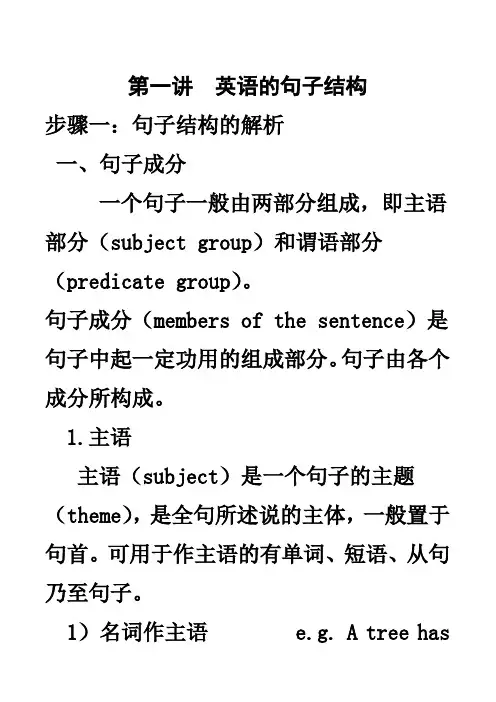
第一讲英语的句子结构步骤一:句子结构的解析一、句子成分一个句子一般由两部分组成,即主语部分(subject group)和谓语部分(predicate group)。
句子成分(members of the sentence)是句子中起一定功用的组成部分。
句子由各个成分所构成。
1.主语主语(subject)是一个句子的主题(theme),是全句所述说的主体,一般置于句首。
可用于作主语的有单词、短语、从句乃至句子。
1)名词作主语 e.g. A tree hasfallen across the road.2) 代词作主语 e.g. You’re not far wrong.3) 数词作主语。
e.g. Three is enough.4)名词化的形容词作主语 e.g. The idle are forced to work.5)副词作主语 e.g. Now is the time.6)名词化得介词作主语 e.g. The ups and downs of life must be taken as they come.7) 不定式作主语 e.g. To find your way can be a problem.8)动名词作主语 e.g. Smokingis bad for you.9)名词化的过去分词作主语 e.g. The disabled are to receive more money.10) 介词短语用作主语e.g. From Yenan to Nanniwan was a three-hour ride on horseback.11) 从句用作主语 e.g. Whenever you are ready will be fine. 12) 句子做主语 e.g. “How do you do” is a greeting.主语可由一个以上的名(代)词等构成,这种主语可叫作并列主语。
e.g. He and I are old friends.英语常用无人称的名词作主语。
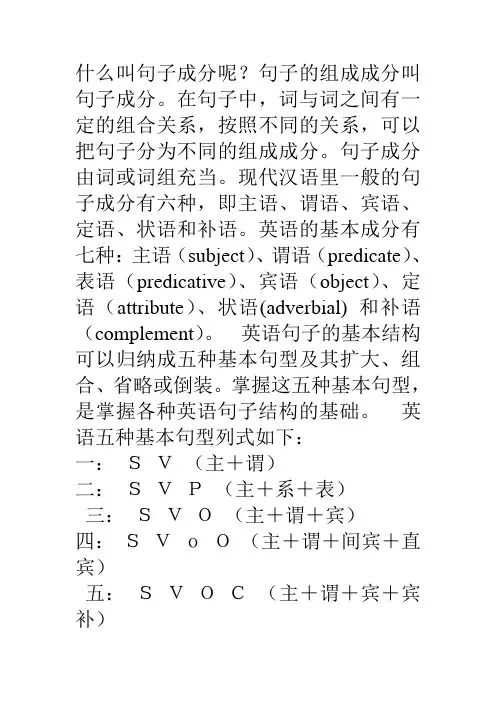
什么叫句子成分呢?句子的组成成分叫句子成分。
在句子中,词与词之间有一定的组合关系,按照不同的关系,可以把句子分为不同的组成成分。
句子成分由词或词组充当。
现代汉语里一般的句子成分有六种,即主语、谓语、宾语、定语、状语和补语。
英语的基本成分有七种:主语(subject)、谓语(predicate)、表语(predicative)、宾语(object)、定语(attribute)、状语(adverbial) 和补语(complement)。
英语句子的基本结构可以归纳成五种基本句型及其扩大、组合、省略或倒装。
掌握这五种基本句型,是掌握各种英语句子结构的基础。
英语五种基本句型列式如下:一:SV(主+谓)二:SVP(主+系+表)三:SVO(主+谓+宾)四:SVoO(主+谓+间宾+直宾)五:SVOC(主+谓+宾+宾补)1. This is an English-Chinese dictionary. 这是本英汉辞典。
2. The dinner smells good. 午餐的气味很好。
3.The sun was shining. 太阳在照耀着。
4.The moon rose. 月亮升起了。
5. They painted the door green. 他们把门漆成绿色6. This set them thinking. 这使得他们要细想一想7.He brought you a dictionary. 他给你带来了一本字典。
8.He denies her nothing. 他对她什么都不拒绝。
9.I want to have a cup of tea. 我想喝杯茶。
10. He admits that he was mistaken. 他承认犯了错误。
Tom is a handsome boy.(handsome修饰名词boy)/Tom是个英俊的男孩。
Tom is a boy who is handsome.1.The place _______interested me most was the Children's Palace. A. Which B. where C. whatD. in which2.Do you know the man _______?A. whom I spokeB. to who spokeC. I spoke toD. that Ispoke3.This is the hotel _______last month.A. which they stayedB. at that they stayedC. where they stayed atD. where they stayed4.Do you know the year ______the Chinese Communist Party was founded?A. whichB. thatC. whenD.on which5.That is the day ______I'll never forget.A. whichB. on whichC. in whichD. when6.The factory ______we'll visit next week is not far from here.A. whereB. to whichC. whichD. in which7.Great changes have takenplace since then in the factory _______we are working.A. whereB. thatC. whichD. there8.This is one of the best films _______.A. that have been shown this yearB. that have shownC. that has been shown this yearD. that you talked9.Can you lend me the book ______the other day?A. about which you talkedB. which you talkedC. about that you talkedD. that you talked10.The pen ______he is writing is mine.A. with whichB. in whichC. on whichD. by which11.They arrived at afarmhouse, in front of ______sat a small boy.A. whomB. whoC. whichD. that12.The engineer ______my father works is about 50 years old.A. to whomB. on whomC. with whichD. with whom 13.It there anyone in your class ______family is in the country?A. whoB. who'sC. whichD. whose14.I'm interested in ______you have said.A. all thatB. all whatC. thatD. which15.I want to use the same dictionary ______was used yesterday.A. whichB. whoC. whatD. as16.He isn't such a man ______he used to be.A. whoB. whomC. thatD. as17.He is good at English, ______we all know.A. thatB. asC. whomD. what18.Li Ming, ______to the concert enjoyed it very much.A. I went withB. withwhom I went C. with who I went D.I went with him 19.I don't like ______ as you read.A. the novelsB. the such novelsC. such novelsD. same novels]20.He talked a lot about things and persons ________they remembered in the school.A. whichB. thatC. whomD.what21.The letter is from my sister, ______is working in Beijing.A. whichB. thatC. whomD. who22.In our factory there are 2,000 workers, two thirds of ____are women.A. themB. whichC. whomD. who23.You're the only person ______I've ever met ______could do it.A. who;/B./; whomC. whom;/D./; who24.I lost a book, ______I can't remember now.A. whose titleB. its titleC. the title of itD. the title of thatst summer we visited the West Lake, ______Hangzhou is famous in the world.A. for whichB. for thatC. in whichD. what26.I have bought such a watch _______ was advertised on TV.A. thatB. whichC. asD. it27.I can never forget the day _______ we worked together and the day ______ we spent together.A. when; whichB. which; whenC. what; thatD. on which; when28.The way ______he looks at problems is wrong.A. whichB. whoseC. whatD./29.This is the reason ______he didn't come to the meeting.A. in whichB. with whichC. thatD. for which30.This machine, ______for many years, is still working perfectly.A. after which I have lookedB. which I have looked afterC. that I have looked afterD. I have looked after31.The reason ______he didn't come was ______he was ill.A. why; thatB.that;whyC. for that;thatD.for which;what32.He is working hard, ______will make him pass the final exam.A.thatB.whichC.for whichD.who33.That is not the way ______I do it.A./B.whichC.for whichD.with which34.I have two grammars, ______are of great use.A. all of whichB. either of whichC. both of thatD. both of which35.I want to use the same tools _______used in your factory a few days ago.A. as wasB. which wasC. as wereD. which36.My neigh bours used to give me a hand in time of trouble, _______ was very kind of them.A. whoB. whichC. thatD. it。
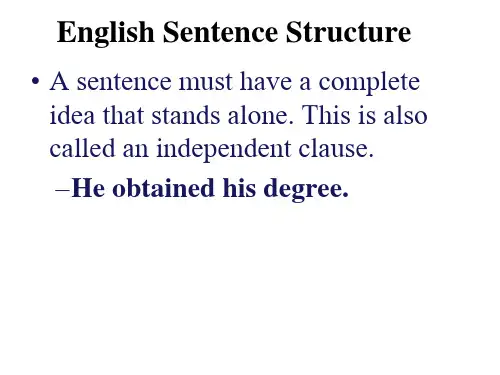
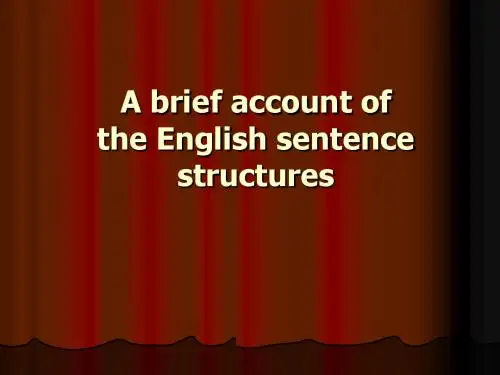
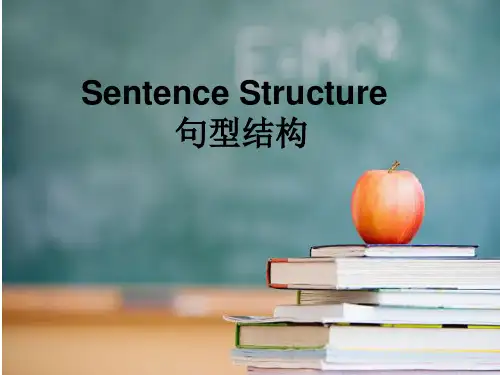
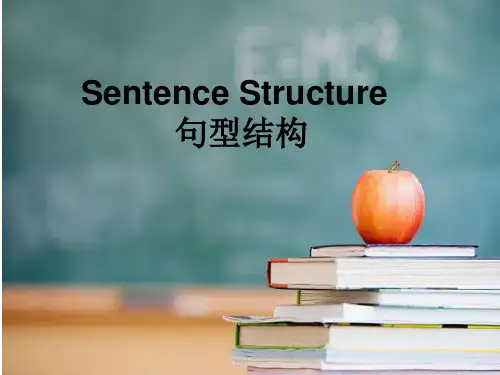

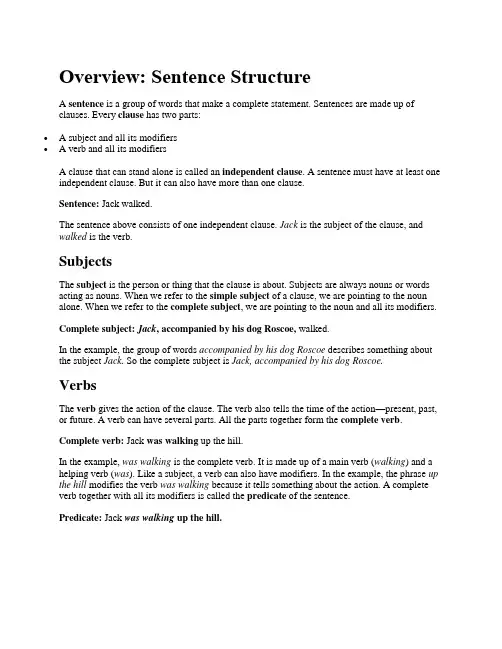
Overview: Sentence StructureA sentence is a group of words that make a complete statement. Sentences are made up ofclauses. Every clause has two parts:∙ A subject and all its modifiers∙ A verb and all its modifiersA clause that can stand alone is called an independent clause. A sentence must have at least oneindependent clause. But it can also have more than one clause.Sentence: Jack walked.The sentence above consists of one independent clause. Jack is the subject of the clause, and walked is the verb.SubjectsThe subject is the person or thing that the clause is about. Subjects are always nouns or words acting as nouns. When we refer to the simple subject of a clause, we are pointing to the noun alone. When we refer to the complete subject, we are pointing to the noun and all its modifiers.Complete subject:Jack, accompanied by his dog Roscoe, walked.In the example, the group of words accompanied by his dog Roscoe describes something about the subject Jack. So the complete subject is Jack, accompanied by his dog Roscoe.VerbsThe verb gives the action of the clause. The verb also tells the time of the action—present, past, or future. A verb can have several parts. All the parts together form the complete verb.Complete verb: Jack was walking up the hill.In the example, was walking is the complete verb. It is made up of a main verb (walking) and a helping verb (was). Like a subject, a verb can also have modifiers. In the example, the phrase up the hill modifies the verb was walking because it tells something about the action. A complete verb together with all its modifiers is called the predicate of the sentence.Predicate: Jack was walking up the hill.Types of Sentences by PurposeSentences can be identified by the purpose they serve. They can be declarative, interrogative, imperative, and exclamatory. Most sentences are declarative. Declarative sentences are statements.Declarative sentence: Dinosaurs would make great pets.Interrogative sentences ask a question. Put a question mark at the end of an interrogative sentence. Interrogative sentences often start with a question word: who, what, where, when, how, whom, whose, which.Interrogative sentence: When will the sales meeting start?Imperative sentences issue a command or an instruction. The subject of an imperative sentence is always you. The subject you is understood; it is not stated in the sentence.Imperative sentence: [You] Please hand in your exam papers.Exclamatory sentences express surprise or strong emotion. An exclamatory sentence ends with an exclamation point.Exclamatory sentence: I can't believe you ate all that ice cream!Turning a Declarative Sentence into an Interrogative SentenceStatements can be turned into questions. You may have to change the word order of the sentence and add a helping verb or a question word.Method 1: If there is a helping verb in the sentence, move it to the start of the statement. Statement: The office will be closed on Monday.Question:Will the office be closed on Monday?Method 2: Add do to the start of the statement. Change the main verb to its present tense form. Statement: The college arranged for more scholarships to be awarded.Question:Did the college arrange for more scholarships to be awarded?Notice that the verb arranged becomes arrange when did is added.Method 3: Change the subject to who, what, or which, or use whose to start the question. Statement:This photo is the best photo in the exhibit.Question:Which is the best photo in the exhibit?Statement:Someone's parents are in the waiting room.Question:Whose parents are in the waiting room?Method 4: Add whom,when, where, or how to the start of the sentence, and put the subject between the helping verb and the main verb.Statement: The class starts in an hour.Question:When will the class start?Question: When does the class start?Notice that a helping verb (will or does) has been added and that the main verb (start) is now in the present tense form.Types of Sentences by StructureFour types of sentence structures are used in writing: simple, compound, complex, and compound-complex.Simple SentencesA simple sentence consists of one independent clause. Notice that a simple sentence can have more than one subject and more than one verb.Simple sentence:They are expecting many opportunities for the future.The sentence above has one subject (They) and one verb (are expecting).Simple sentence: I have plans for the future and want to realize them all.The preceding sentence has one subject (I) and two verbs (have, want).Simple sentence:Ed and Jim took the dogs for a walk.In the preceding example, there are two subjects (Ed, Jim) and one verb (took).Simple sentence:Margarita and I shop and gossip at the mall.The example above has two subjects (Margarita, I) and two verbs (shop, gossip).Compound SentencesA compound sentence consists of two or more independent clauses joined together. The clauses can be joined by a comma and a coordinating conjunction (and, but, for, nor, or, so, or yet) or by a semicolon.Compound sentence: Natasha and Christy wanted to stay in a fancy hotel, but they didn't have enough money.Compound sentence: Natasha and Christy went to Mexico on vacation; they used their savings to pay for the trip.Complex SentencesA complex sentence is composed of one independent clause and at least one dependent clause.A dependent clause begins with either a subordinating conjunction or a relative pronoun. Complex sentence: Because I registered early, I got the classes I wanted.In the example, the dependent clause is Because I registered early. The dependent clause can come before or after the independent clause.Hint: As shown in the example, a comma comes after a dependent clause that starts a sentence. Here are lists of subordinating conjunctions and relative pronouns.Subordinating Conjunctionsafter because since untilalthough before so whenas even if so that w heneveras if even though than whereas long as how that whereveras soon as if though whetheras though in order that unless whileRelative Pronounswho whom whose which thatCompound-Complex SentencesA compound-complex sentence has at least two independent clauses and at least one dependent clause.Compound-complex sentence: Because I started my report early, I handed it in on time, but many students had trouble meeting the deadline.In the example, the dependent clause is Because I started my report early. The independent clauses are I handed it in on time and many students had trouble meeting the deadline.Compound-complex sentence: Because I started my report early, I handed it in on time; however, many students had trouble meeting the deadline.In this example, the complex and compound sentences are joined by a semicolon. Notice that the transitional word (however) is followed by a comma.Combining SentencesYou can combine different types of clauses to achieve variety in your writing. Use coordinating conjunctions, subordinating conjunctions, and relative pronouns to join the clauses.Creating Compound SentencesYou can create a compound sentence from two (or more) simple sentences. Join the simple sentences with a comma and a coordinating conjunction (and, but, for, nor, or, so, or yet). Or use a semicolon to join the simple sentences.Simple sentence: Amy enjoys reading.Simple sentence: Amy can read very quickly.Compound sentence: Amy enjoys reading, and she can read very quickly.Compound sentence: Amy enjoys reading; she can read very quickly.Creating Complex SentencesYou can use subordinating conjunctions and relative pronouns to make a simple sentence (an independent clause) into a dependent clause. Then you can add the new dependent clause to an independent clause to produce a complex sentence that adds interest and variety to your writing. How do you know which simple sentence should be independent and which should be dependent? The idea that you think is more important should be the independent clause. The less important idea will then be the dependent clause. The following example shows how to combine simple sentences to make a complex sentence.Simple sentence: Devin has a demanding job.Simple sentence: Devin really enjoys his job.Complex sentence: Though Devin has a demanding job, he really enjoys it.This complex sentence stresses that Devin enjoys his job. That the job is demanding is less important, so the dependent clause is Though Devin has a demanding job.Complex sentence: Devin has a demanding job, though he really enjoys it.In this complex sentence, the fact that Devin's job is demanding is the important point, so it is stated in the independent clause and though he really enjoys it is the dependent clause.Hint: If the dependent clause starts the sentence, follow it with a comma.Creating Compound-Complex SentencesCombine a compound sentence with a complex sentence to get a compound-complex sentence. The independent clauses make the sentence compound, and the dependent clauses make it complex. Here is an example.Simple sentence: She is selling her old house.Simple sentence: Her house has only one bedroom.Simple sentence: She plans to buy a bigger house.Compound-complex sentence: She is selling her old house, which has only one bedroom, and she plans to buy a bigger house.Compound-complex sentence: She is selling her old house, which has only one bedroom; undoubtedly, she plans to buy a bigger house.The two independent clauses are She is selling her old house and she plans to buy a bigger house, and the dependent clause is which has only one bedroom.Sentence PunctuationWhen you are joining sentences together, remember to use correct punctuation.End Punctuation for All SentencesUse a period to end a declarative sentence or an imperative sentence, a question mark to end an interrogative sentence, and an exclamation point to end an exclamatory sentence.Declarative sentence: Dinosaurs would make great pets.Interrogative sentence: When will the sales meeting start?Imperative sentence: [You] Please hand in your exam papers.Exclamatory sentence: I can't believe you ate all that ice cream!Hint: An imperative sentence that expresses strong emotion or surprise can be ended with an exclamation point: Watch out for the truck!Compound SentencesTo join the independent clauses in a compound sentence, use (1) a comma plus a coordinating conjunction or (2) a semicolon. Remember that a comma alone is not strong enough to join independent clauses.Compound sentence: Natasha and Christy wanted to stay in a fancy hotel, but they didn't have enough money.Compound sentence: Natasha and Christy went to Mexico on vacation; they used their savings to pay for the trip.Complex SentencesIn a complex sentence, if the dependent clause comes first, use a comma after it. If the independent clause comes first, you do not usually need to use a comma after it.Complex sentence: Because I registered early, I got the classes I wanted.Complex sentence: I got the classes I wanted because I registered early.Compound-Complex SentencesTo join a complex sentence to a simple sentence, use (1) a comma and a coordinating conjunction or (2) a semicolon.Compound-complex sentence: Because I started my report early, I handed it in on time, but many students had trouble meeting the deadline.Compound-complex sentence: Because I started my report early, I handed it in on time; however, many students had trouble meeting the deadline.In the complex sentence, you will also need a comma after the dependent clause if it precedes the independent clause. Also, remember to use a comma after a transitional expression such as however.Overview: FragmentsA fragment is a piece of a sentence that is punctuated as a complete sentence. But it does not express a complete thought. Once you learn how to identify fragments, you can avoid them in your writing.A complete sentence must have both a subject and a verb. If one or both are missing or if the subject and verb are introduced by a dependent word, you have only part of a sentence, a fragment. Even if it begins with a capital letter and ends with a period, it cannot stand alone and must be corrected in your writing.Type 1: -ing FragmentsBreaking the sidewalk. The oak tree is large and strong.Correction 1:Connect the fragment to the sentence before or after it.Example: Breaking the sidewalk, the oak tree is large and strong.Correction 2:Make the fragment into an independent clause.Example: The oak tree is breaking the sidewalk. The oak tree is large and strong.Type 2: to FragmentsSome people have moved. To live in the heart of town.Correction 1:Connect the fragment to the sentence before or after it.Example: Some people have moved to live in the heart of town.Correction 2:Make the fragment into an independent clause.Example: Some people have moved. They live in the heart of town.Hint: A to fragment can also occur at the beginning of a sentence. In this case, insert a comma between the two sentence parts when correcting the fragment.To live in the heart of town, some people have moved.Type 3: Dependent-Clause FragmentsBecause there are no malls here. We go to another city to shop.Correction 1:Connect the fragment to the sentence before or after it.Example: Because there are no malls here, w e go to another city to shop.Correction 2:Make the fragment into an independent clause.Example: T here are no malls here. We go to another city to shop.Hint: If the dependent clause comes first, put a comma between the two parts of the sentence. If the dependent clause comes second, the comma is not necessary.Because there are no malls here, we go to another city to shop.We go to another city to shop because there are no malls here.Type 4: Afterthought FragmentsHe works at the garage. And the bank.Correction 1:Connect the fragment to the sentence before or after it.Example: He works at the garage and the bank.Correction 2:Make the fragment into an independent clause.Example: He works at the garage. He also works at the bank.The first correction connects the fragment to the sentence before it. The second correction makes the fragment an independent clause with its own subject and verb.Type 5: Relative-Clause FragmentsThe hardware store is on the corner. Which is a good location.Correction 1:Connect the fragment to the sentence before or after it.Example: The hardware store is on the corner, w hich is a good location.Correction 2:Make the fragment into an independent clause.Example: The hardware store is on the corner. It is a good location. Overview: Run-onsWhen we join two complete statements (independent clauses) into a single sentence without correct punctuation, we create a run-on. Because we cannot always "hear" punctuation, we often create run-ons when we try to write the way we speak. These run-together sentences generally distort our message and cause problems for our readers.Run-on sentences fall into one of two categories: fused sentences and comma splices. A fused sentence has two complete thoughts (independent clauses) with no punctuation between them. A comma splice has two complete thoughts separated only by a comma. A comma is not a strong enough punctuation mark to separate two independent clauses. Both the fused sentence and the comma splice incorrectly join two independent clauses.Fused Sentence: The movie ended I went home.Comma Splice: The movie ended, I went home.You have four different options for correcting your run-together sentences.1.Separate the two independent clauses with a period, and capitalize the next word.2.Separate the two independent clauses with a comma, and add a coordinating conjunction (and,but, for, nor, or, so, or yet).3.Change one of the independent clauses into a dependent clause with a subordinating conjunction(such as if, because, since, after, or when) or a relative pronoun (who, whom, whose, which, or that).4.Separate the two independent clauses with a semicolon.Method 1: Use a PeriodSeparate the two independent clauses with a period, and capitalize the next word.Fused sentence: She was lying on the sofa she had just eaten lunch.Corrected sentence: She was lying on the sofa. She had just eaten lunch.Comma splice: I began to think about my brother, I felt good.Corrected sentence: I began to think about my brother. I felt good.Method 2: Use a Coordinating ConjunctionSeparate the two independent clauses with a comma, and add a coordinating conjunction (and, but, for, nor, or, so, or yet).Fused sentence: She was lying on the sofa she had just eaten lunch.Corrected sentence: She was lying on the sofa, for she had just eaten lunch.Comma splice: I began to think about my brother, I felt good.Corrected sentence: I began to think about my brother, so I felt good.Method 3: Create a Dependent ClauseChange one of the independent clauses into a dependent clause with a subordinating conjunction (such as if, because, since, after, or when) or a relative pronoun (who, whom, whose, which, or that).Fused sentence: She was lying on the sofa she had just eaten lunch.Corrected sentence: She was lying on the sofa because she had just eaten lunch.Comma splice: I began to think about my brother, I felt good.Corrected sentence: Whenever I began to think about my brother, I felt good.Hint: If you put the dependent clause at the beginning of the sentence, add a comma between the two sentence parts.Because she had just eaten lunch, she was lying on the sofa.Method 4: Use a SemicolonSeparate the two independent clauses with a semicolon.Fused sentence: She was lying on the sofa she had just eaten lunch.Corrected sentence: She was lying on the sofa; she had just eaten lunch.Comma splice: I began to think about my brother, I felt good.Corrected sentence: I began to think about my brother; I felt good.When you use a semicolon, you can also add a transition, a word or an expression that indicates how the two independent clauses in the sentence are related. A transition often makes the sentence smoother. It is placed after the semicolon and is followed by a comma.She was lying on the sofa; in fact, she had just eaten lunch.I began to think about my brother; consequently, I felt good.Here are some transitions commonly used with semicolons.Transitions Used with a Semicolon Before and a Comma Afteralso for instance in fact of courseconsequently furthermore instead otherwisefinally however meanwhile similarlyfor example in contrast nevertheless thereforeOverview: Pronoun CasePronouns are words that take the place of nouns. They help us avoid repeating nouns. Pronouns take different forms according to their use in a sentence. A subject pronoun may appear as the subject of a clause or sentence. An object pronoun may appear after a verb to show that someone or something receives the action of the verb, or it may be an object of a preposition. The following lists show the subject and object forms of pronouns.Subject PronounsSingular PluralI weyou youhe, she, it theyObject PronounsSingular Pluralme usyou youhim, her, it themThere are five common types of pronoun case problems: (1) using the wrong pronoun as a subject, (2) using the wrong pronoun as an object, (3) using an apostrophe with a possessive pronoun, (4) misusing demonstrative pronouns, and (5) misusing pronouns in comparisons. Pronouns as SubjectsA pronoun used alone as a subject usually doesn't cause problems.Subject pronoun:We gave to charity.You wouldn't say "Us gave to charity." But an error often occurs when a sentence has a compound subject and one or more of the subjects is a pronoun. In a compound subject, two or more nouns and pronouns are joined by a coordinating conjunction.Not: The boys and us played ball.Correct: The boys and we played ball.To test whether you have the correct form of the pronoun in a compound subject, try each subject alone.Subject pronoun?The boys and us played ball.Test:The boys played ball. YESTest:Us played ball. NOTest:We played ball. YESCorrect:The boys and we played ball.Pronouns as ObjectsThe object pronoun error usually occurs with compound objects. In a compound object, two or more nouns and pronouns are joined by a coordinating conjunction.Not: She gave Alisha and I some candy.Correct: She gave Alisha and me some candy.Also, remember to use only object pronouns in prepositional phrases.Not: This is just between you and I.Correct: This is just between you and me.You can test whether you have the correct pronoun by trying each object separately.Object pronouns? She gave Alisha and I some candy.Test: She gave Alisha some candy. YESTest: She gave I some candy. NOTest: She gave me some candy. YESCorrect: She gave Alisha and me some candy.Possessive PronounsPossessive pronouns show ownership (my boat, his bed, our horse). An apostrophe is used with nouns to show ownership (Jack's cat, the worker's tools, the committee's vote). But an apostrophe is never used with possessive pronouns.Not: The cat licked its' paws.Correct: The cat licked its paws.Not: The apple on the counter is your's.Correct: The apple on the counter is yours.Here is a list of possessive pronouns.Possessive PronounsSingular Pluralmy, mine our, oursyour, yours your, yourshis, her, hers their, theirsDemonstrative PronounsThere are four demonstrative pronouns: this, that, these, and those.Demonstrative pronouns point to specific people or objects. Use this and these to refer to items that are near, and that and those to refer to items farther away. Look at the following examples.Demonstrative (near):This is my new laptop that I am holding.Demonstrative (near):These are library books in my book bag.Demonstrative (farther):That is the bank across the street.Demonstrative (farther):Those are the picture frames that arrived yesterday.Sometimes demonstrative pronouns are used incorrectly with here, there, ones, and similar words.Not: I'll give you these here clothes.Correct: I'll give you these clothes.Not:Those ones were in the garage.Correct:Those were in the garage.When demonstrative pronouns are used with nouns, they become adjectives.Adjective:This dog is his.Adjective: You will always cherish those memories.The problems that occur with demonstrative pronouns can also occur when these pronouns act as adjectives.Not: Please hand me that there pen.Correct: Please hand me that pen.Pronouns in ComparisonsSometimes pronoun problems occur in comparisons with than or as. An object pronoun may mistakenly be used instead of a subject pronoun. To find out if you are using the right pronoun, you should finish the sentence, as shown here.Not: She can crochet better than me.Correct: She can crochet better than I [can crochet].Not: Beatrice is as good a runner as him.Correct: Beatrice is as good a runner as he [is].Hint: Sometimes an object pronoun is required in a than or as comparison. But errors rarely occur in this case because the subject pronoun sounds so unnatural.Not: Elaine likes him more than she likes I.Correct: Elaine likes him more than she likes me.Pronouns Used with NounsSometimes a first-person plural pronoun (we, us) appears just before a noun. If the noun is a subject, you should use the subject form of the pronoun. If the noun is an object, you should use the object form of the pronoun. Look at the following examples.Subject noun and pronoun: We dancers performed well today.Object noun and pronoun: The band leader praised us musicians last night.Object noun and pronoun: The audience appreciated the talent displayed by us singers. Overview: Misplaced or Dangling ModifiersA modifier describes another word or group of words. Sometimes, however, a modifier is too far from the words it refers to (misplaced modifier), or the word it refers to is missing altogether (dangling modifier). As a result, the sentence is confusing.Misplaced ModifiersA modifier should be placed as close as possible to the word or words it modifies, but this does not always happen. A misplaced modifier is too far from the word or words it refers to, and that makes the meaning of the sentence unclear. Look at this example.Not: The gardener prunes the tree that grows in the backyard in May.(Does the tree in the backyard grow only in May? Probably not. But the gardener prunes it only in May. So the modifier in May needs to be moved closer to the word it actually modifies.) Correct:In May, the gardener prunes the tree that grows in the backyard.Certain modifiers that limit meaning are often misplaced. Look at how meaning changes when you move the limiting word only in the following sentences:Only Rachel plans to meet Sally for lunch at the Pepper Cafe.(No one but Rachel will meet Sally.)Rachel only plans to meet Sally for lunch at the Pepper Cafe.(Rachel plans to meet her but might not show up.)Rachel plans only to meet Sally for lunch at the Pepper Cafe.(Rachel plans to meet Sally for lunch and do nothing else.)Rachel plans to meet only Sally for lunch at the Pepper Cafe.(Rachel plans to meet no one but Sally.)Rachel plans to meet Sally only for lunch at the Pepper Cafe.(Rachel does not plan to meet for any other reason.)Rachel plans to meet Sally for lunch only at the Pepper Cafe.(Rachel plans to have lunch there but no other meals.)Rachel plans to meet Sally for lunch at the Pepper Cafe only.(Rachel does not plan to meet at any other place.)Here is a list of common limiting words.almost, even, hardly, just, merely, nearly, only, scarcelyDangling ModifiersModifiers are "dangling" when they have nothing to refer to in a sentence. Dangling modifiers start with an -ing word or with to and often appear at the beginning of a sentence. Here are two examples.Not:Surfing the Internet, my computer mouse is very helpful.Not:To play the lottery, a ticket must be bought.A modifier usually modifies the words closest to it. So in the first example, the phrase Surfing the Internet appears to modify my computer mouse. But "my mouse" doesn't surf the Internet. In fact, there is no word in the sentence that the phrase Surfing the Internet logically modifies. The phrase is left dangling. You can correct a dangling modifier in one of two ways—by inserting the missing word that is being referred to or by rewriting the sentence.Method 1: Insert the Missing WordCorrect:Surfing the Internet, I find my computer mouse very helpful.Correct:To play the lottery,you must buy a ticket.In the first example, the word (I) that the phrase Surfing the Internet modifies is now the subject of the sentence. In the second example, the word (you) that the phrase To play the lottery modifies is now the subject of the sentence.Method 2: Rewrite the SentenceCorrect:When I am surfing the Internet, my computer mouse is very helpful.Correct: You must buy a ticket if you want to play the lottery.In the first example, the dangling –ing modifier Surfing the Internet has been rewritten as a dependent clause with a subject and verb. In the second example, the dangling to modifier has been rewritten as a dependent clause with a subject and verb.Overview: Parallelism。
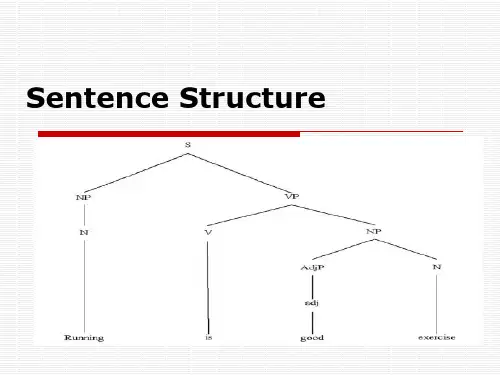
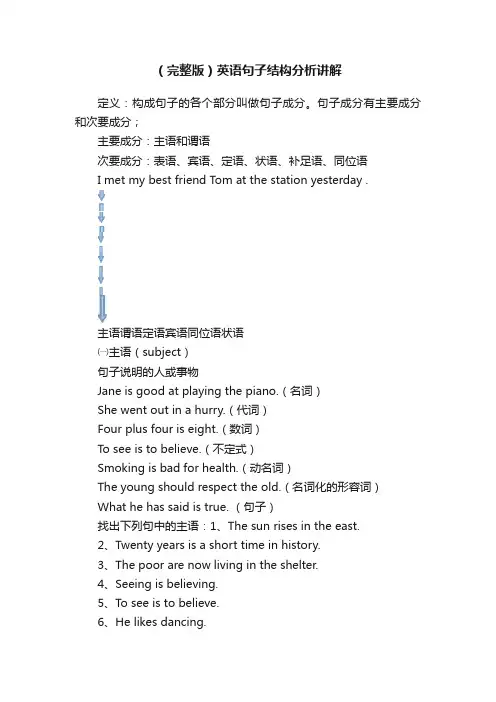
(完整版)英语句子结构分析讲解定义:构成句子的各个部分叫做句子成分。
句子成分有主要成分和次要成分;主要成分:主语和谓语次要成分:表语、宾语、定语、状语、补足语、同位语I met my best friend Tom at the station yesterday .主语谓语定语宾语同位语状语㈠主语(subject)句子说明的人或事物Jane is good at playing the piano.(名词)She went out in a hurry.(代词)Four plus four is eight.(数词)To see is to believe.(不定式)Smoking is bad for health.(动名词)The young should respect the old.(名词化的形容词)What he has said is true. (句子)找出下列句中的主语:1、The sun rises in the east.2、Twenty years is a short time in history.3、The poor are now living in the shelter.4、Seeing is believing.5、To see is to believe.6、He likes dancing.7、What he needs is a book.8、It is very clear that the elephant is round and tall likea tree. ㈡谓语说明主语的动作、状态和特征简单谓语:由动词或动词词组组成I saw the flag on the top of the hill?He looked after two orphans.复合谓语:由情态动词或助动词+动词;He can speak English well.She doesn’t seem to like dancing.找出下列句中的谓语(注:只有动词才可作谓语。
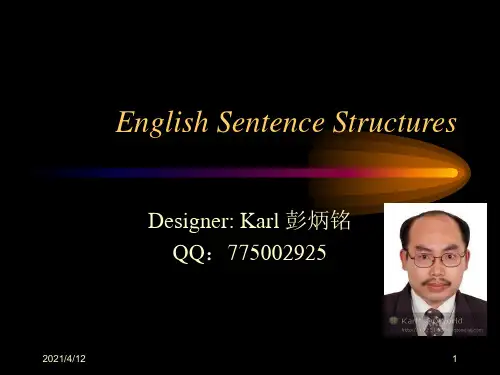
sentencestructures一、~~~ the + ~ est + 名词 + (that) + 主词 + have ever + seen ( known/heard/had/read, etc)~~~the most + 形容词+ 名词+ (that) + 主词+ have ever + seen ( known/heard/had/read, etc)例句:Helen is the most beautiful girl that I have ever seen.海伦是我所看过最美丽的女孩。
Mr. Chang is the kindest teacher that I have ever had.张老师是我曾经遇到最仁慈的教师。
二、 Nothing is + ~~~ er than +不定式(to+do).Nothing is + more + 形容词 + than +不定式(to+do).例句:Nothing is more important than to receive education.没有比接受教育更重要的事。
三、~~~ cannot emphasize the importance of ~~~ too much.(再怎么强调...的重要性也不为过。
)例句:We cannot emphasize the importance of protecting our eyes too much.我们再怎么强调保护眼睛的重要性也不为过。
四、 There is no denying that + S + V ...(不可否认的...)例句:There is no denying that the qualities of our living have gone from bad to worse.不可否认的,我们的生活品质已经每况愈下。
五、 It is universally acknowledged that + 句子~~ (全世界都知道...)例句:It is universally acknowledged that trees are indispensable to us.全世界都知道树木对我们是不可或缺的。
有关于英语句子结构分析随着社会的发展,英语已成为个人甚至一个国家发展的重要工具,每个人都希望说一口流利的英文。
小编精心收集了有关于英语句子结构,供大家欣赏学习!有关于英语句子结构11. 主语:表示句子所要说明或描述的人或事物,一般由名词、代词或相当于名词的词组或句子充当,置于句首。
如:It's getting cold. 天冷起来了。
Now everything is ready. 现在一切都准备好了。
The teacher is very kind to us. 老师对我们很好。
2. 谓语:说明或描述主语的动作、状态或特征,由动词或动词短语充当,位于主语之后。
如:Mother bought me a VCR. 妈给我买了一台录像机。
We have finished our work already. 我们已经完成了工作。
3. 表语:表示主语的身份、性质、状态和特征,一般由名词、形容词、或相当于名词、形容词的词、短语或句子充当,位于连系动词之后,与连系动词一起构成句子的谓语。
如:Be careful! 小心!He looks very angry. 他看上去很生气。
His job is looking after sheep. 他的任务是看羊。
4. 宾语:指动作所涉及的人或事物,一般由名词、代词或相当于名词的词组或句子充当,位于动词之后。
如:He wrote many plays. 他写了许多剧本。
She loves swimming. 她喜欢游泳。
5. 宾语补足语:用来对宾语进行补充和说明,一般由名词、非谓语动词、形容词等充当。
如:He told us to stay. 他叫我们留下。
I've never seen her dancing. 我从未看见过她跳舞。
I found it difficult to refuse him. 我感到很难拒绝他。
6. 定语:对名词或代词进行修饰、限制或说明,一般由形容词、名词、代词、数词、介词短语、非谓语动词及句子等充当,位置可在所修饰的词之前,也可在所修饰的词之后(详见形容词一章)。
Sentence Structures:1. 简单句:一般疑问句特殊疑问句主谓宾Go! I say. I drive my car. She plays the piano.主谓宾+ 宾语补足语I tell you a news Please lend me 10 dollars.主系表系动词1. be(am, is , are, was,were) 2. 感官动词:sound,look/seem,smell,taste,feel 3. 变化动词:become,get,turn名词作表语,表示主语的名称,职业,物种。
This is a table. I am a teacher. It is a cat. These are books.形容词做表语,表示主语的性质,特征。
The girl is beautiful. The river is wide.感官动词The song sounds beautiful. She looks very upset(悲伤). The flower smells fragrant(芬芳).The dish tastes very yummy(美味的). I feel happy.变化动词:We become friends. He gets angry. It gets dark. The apple turns red.一般疑问句: 由系动词be ,助动词do does did,will/shall, have/has/had, 情态动词引导的句子,回答时用yes,no回答。
特殊疑问句,有特殊疑问词引导的句子,回答时问什么答什么。
what,who, where, when, how, which, why 2. 并列句:并列and, as well as,递进,转折but, while,选择or. 将两个简单句用并列连词连接起来的句子.I am a student and you are a teacher. I am learning English and she is playing the piano.Please come here and look at my photos. Come upstairs and do me a favor.I washed the clothes clean but the kids make it dirty.I left my purse/ wallet on table but it is not here now.You can help me or you’d better shut up. Love me or leave me!3. 状语从句:时间,地点,条件(if,unless),原因(because, because of+短语,as, for, since),结果(so, so…that),目的(in order to, so that , in case of),方式(by+ 交通工具,in+ 语言,方法,as 按照,as the way),让步(Although,though,even if,even though,as),比较(同级as…as, the same…as 比较级:A+ be/v + 形容词比较级+ than+ B 最高级A + be/v + the + 形容词最高级+ 比较范围)I dreamed that I would be a pilot in the future when I was six.He was listening to the music when I came in.I was learning English carefully while he was making a loud noise.Where there is a will, there is a way. 有志者事竟成。